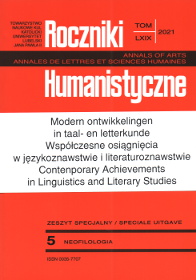Why Is Dutch Passive Voice a Stumbling Block for Polish Students?
Abstract
This contribution explains why the Dutch passive voice is a problem for Polish students and how passive constructions and their equivalents in their native language interfere in their use. The contribution first briefly introduces the passive voice constructions in Dutch and Polish. Then is shown, on the basis of translated sentences, where and in which elements the problem lies. The first reason is that both the worden-passief (action-passive) and the zijn-passief (state-passive) can be translated in Polish with the verb to be. Polish second language speakers of Dutch speak of a state while meaning an event (or vice versa). Moreover, the impersonal passive (except for very rare cases), which is often used in Dutch, is absent in Polish. In case of active use of Dutch by Polish students, they will tend to avoid passive constructions rather and replace them by constructions similar to equivalents of the impersonal passive as expressed in their Polish mother tongue.
References
Ackema, Peter. Inflection. In syntax below zero. Onderzoeksinstituut voor Taal en Spraak, 1995.
Algemene Nederlandse Spraakkunst, onder redactie van Walter Haeseryn, Kirsten Romijn, Guido Geerts, Jaap de Rooij & Maarten C. van den Toorn. (2e druk). Martinus Nijhoff/Wolters Plantyn, 1997.
Aantjes, Jeroen. Semantische verschillen in werkwoorden op de rand van onaccusativiteit. Universiteit Utrecht, BA thesis, 2016.
Carnie, Andrew, en Heidi Harley. “Existential Impersonals.” Studia Linguistica, vol. 59, 2005, pp. 45-46.
Comrie, Bernard. “In defense of spontaneous demotion: The impersonal passive.” Grammatical relations, onder redactie van Peter Cole en Jerrold Sadock, Academic Press, 1977, pp. 47-58.
Cornelis, Louise. Passive and perspective. Rodopi, 1997.
Czochralski, Jan. Aspektualität im Polnischen und Deutschen. Państwowe Wydawnictwo Naukowe, 1975.
Engelbrecht, Wilken. “Aspectualiteit van het Nederlands als probleem voor Tsjechische studenten.” Neerlandica Wratislaviensia, vol. 17, 2008, pp. 185-199.
Flor, Agnieszka. Een contrastief onderzoek naar gebruik van het passief in literaire vertalingen Nederlands-Pools en Pools-Nederlands Casus Mulisch en Myśliwski. Wydawnictwo KUL, 2019.
Frajzyngier, Zygmunt. “Indefiniete agent, passive and impersonal passive: a functional study.” Lingua, vol. 58, 1982, pp. 267-290.
Górski, Rafał L.. Diateza nacechowana w polszczyźnie. Studium korpusowe. Prace Instytutu Języka Polskiego PAN 133. Lexis, 2008.
Grzegorczykowa, Renata, Roman Laskowski en Henryk Wróbel. Gramatyka współczesnego języka polskiego. Morfologia. Wydawnictwo Naukowe PWN, 1998.
Haan, Sies de. “Heeft het Nederlands echt geen passief?” Samengevoegde woorden. Voor Wim Klooster bij zijn afscheid als hoogleraar, onder redactie van Hans den Besten, Els Effers en Jan Luif, Universiteit van Amsterdam, 2000, pp. 111-124.
Kirsner, Robert S. “De ‘onechte lijdende vorm’.” Spektator, vol. 6, 1976/7, pp. 1-18.
Klooster, Wim G. Grammatica van het hedendaags Nederlands. Sdu Uitgevers, 2001.
Klooster, Wim G., en Albert Kraak. Syntaxis. Stam-Kemperman, 1968.
Luif, Jan. In verband met de zin: inleiding in de Nederlandse spraakkunst. 5e druk, Amsterdam University Press, 2011.
Mulisch, Harry. De Aanslag. Bezige Bij, 2009.
Mulisch, Harry. Zamach. Vertaling Ryszard Pyciak, Czytelnik, 1988.
Myśliwski, Wiesław. Traktat o łuskaniu fasoli. Znak, 2006.
Myśliwski, Wiesław. Over het doppen van bonen. Vertaling Karol Lesman, Querido, 2017.
Nagórko, Alicja. Podręczna Gramatyka Języka Polskiego. Wydawnictwo Naukowe PWN, 2010.
Perlmutter, David. “Impersonal passives and the unaccusative hypothesis.” Proceedings of the Fourth Annual Meeting of the Berkeley Linguistic Society, 1978, pp. 157-189.
Pesetsky, David. Summary of unaccusativity and related issues. Class handout, course 24.902. MIT Press, 2002.
Rawoens, Gudrun, Anika Johansson en Heleen Boons. “Het onpersoonlijk passief in het Nederlands en het Zweeds.” Internationale Neerlandistiek, vol. 54, nr. 2, 2016, pp. 99-116.
Ryu, Byong-Rae. “Argument structure and unaccusativity in the constraint-based lexicon.” Language, Information and Computation: Selected Papers from the 11th Pacific Asia Conference on Language. Information and Computation (PACLIC11), 1996, pp. 327-336.
Vandenbosch, Luc. Aspekten van passiefvorming in het Nederlands. Een kognitief-pragmatische benadering. Universiteit Antwerpen, PhD thesis, 1992.
Vandeweghe, Willy. Grammatica van de Nederlandse zin. Garant, 2013.
Zaenen, Annie. “Unaccusativity in Dutch: Integrating syntax and lexical semantics.” Semantics and the lexicon, onder redactie van James Pustejovsky, Springer, 1993, pp. 129-161.
Copyright (c) 2021 Roczniki Humanistyczne

This work is licensed under a Creative Commons Attribution-NonCommercial-NoDerivatives 4.0 International License.





